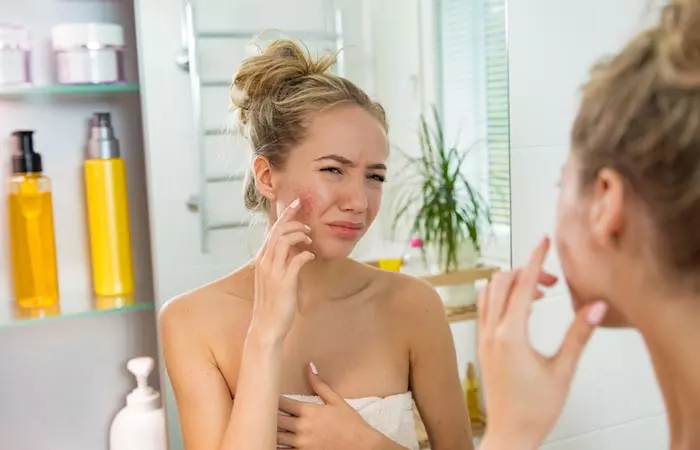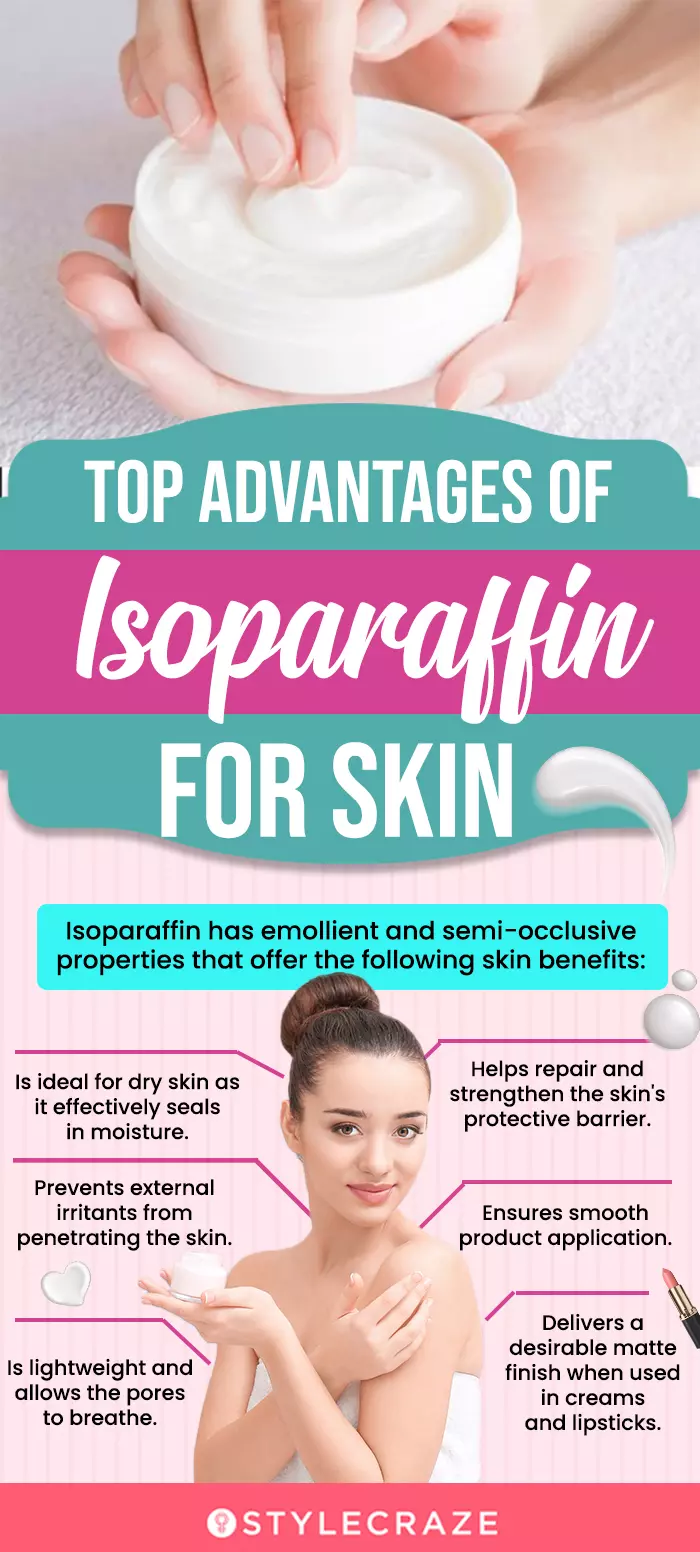Is there any reason for you to be concerned about isoparaffin? What are the reasons for all the controversies regarding isoparaffin? Should you really avoid it? Keep reading to learn the answers to the queries and the truth about isoparaffin.
What Is Isoparaffin?
Isoparaffin is a type of petroleum-based mineral oil or alkane found in creams, lotions, and moisturizers. There are 24 different isoparaffins used in cosmetic and skincare product formulations to add texture and make them viscous. It is the ingredient that gives your daily creams a thick and creamy feel without greasiness. What Are Its Benefits? It helps lock in skin moisture, repairs the skin, strengthens barrier function, and prevents irritants from penetrating the skin. Who Can Use It? Anyone with dry and flaky skin can use isoparaffin, even pregnant women. How Often? You can use it every day. Caution Avoid isoparaffin-based products if you have oily and pimple-prone skin, as they may aggravate your acne.
The most common isoparaffins found in cosmetic formulations include (1): This is one of the most used mineral oils for the skin made of carbon and hydrogen atoms. It does not cause any reaction and mixes well with other ingredients to enhance your skin. This brings us to the most concerning question – is isoparaffin safe for the skin? Let’s find out.
Is Isoparaffin A Safe Ingredient For Your Skin?
The answer is – yes! According to the Cosmetic Ingredient Review (CIR) expert panel, isoparaffins are safe to use in cosmetic formulations. The concentration of isoparaffins used in beauty products ranges from 0.0001% (C13-14 Isoparaffin) to 90% (Isodedocane). The expert panel did not find any evidence of carcinogenic potential from exposure to isoparaffins in cosmetics (1). What if you inhale it when you use hair sprays and deodorants? Well, the average particle diameter in aerosol sprays has a mean of ~38 µm, and 99% of the isoparaffin particle diameter range between 10–110 µm. Hence, anything less than 10 µm is respirable. This means isoparaffins in aerosols are non-respirable (1). In animal studies, isoparaffins caused skin sensitization and ocular irritation. However, in human studies, these chemicals, whether used alone or in formulations, were found tolerable and not classified as irritants, sensitizers, phototoxici Any specific chemical or substance that causes toxic effects on the skin when exposed to excess sunlight. , or photosensitizersi A class of chemicals that increase sensitivity to light and make the skin irritable or inflamed. (2). Only isohexadecane (undiluted) induced mild skin irritation in patients. However, it did not induce irritation when used in 10% concentration (in petrolatum). Other than this,
The FDA permits using a synthetic form of isoparaffin hydrocarbons to coat fruits and vegetables (3). On a scale of 1 to 10 (10 being the most harmful), the Environmental Working Group (EWG) rates C13-14 isoparaffin as 1 in terms of safety (4).
However, according to dermatology, there are some safety concerns regarding the possible contamination of isoparaffins.
Side Effects And Risks Associated With Isoparaffin
Since isoparaffin is derived from petroleum, there are chances of 1,4-dioxane contamination, which may cause skin irritation and allergies, and the FDA considers it as a potential human carcinogen. However, an evaluation of products to trace the presence of 1,4-dioxane by the International Cooperation on Cosmetics Regulations (ICCR) reported that the chemical levels are within the acceptable margin. Therefore, the expert panel concluded that trace levels of 1,4-dioxane (less than 10 ppm) in cosmetic products are safe (5), (6).
Benefits Of Isoparaffin For Skin
Isoparaffin works as an emollient and has semi-occlusive properties. It:
Helps lock in skin moisture (best for dry skin). Repairs the skin and strengthens the skin’s barrier. Prevents the extremal irritants from penetrating the skin. Ensures smooth product application. Feels weightless and does not choke the skin pores. Gives the desired matte finish (when used in creams and lipsticks).
How To Use Isoparaffin For Skin
Isoparaffin is included in skin and hair care products, such as creams, lotions, and moisturizers, and you do not get it separately. As a moisturizer, this ingredient is suitable for dry and flaky skin. Check the ingredients of the products before buying them. Though isoparaffin on its own is non-comedogenici Any substance or ingredient found in skin care and makeup products that does not clog pores. , since it may also function as an occlusive, it is better to avoid it if you have acne-prone or oily skin. Is Isoparaffin the same as paraffin? Paraffin are saturated hydrocarbons with a tree-like structure, whereas isoparaffins are paraffin derivatives with a branched-chain structure. Isoparaffins are commonly used in cosmetic formulations. Is Isoparaffin safe for pregnancy? Animal studies suggest that isoparaffins do not induce any adverse effects and are safe to use during pregnancy (2). Is Isoparaffin organic or inorganic? Isoparaffin is organic in nature as it is composed of organic molecules and other organic compounds. Is Isoparaffin water soluble? No, isoparaffin is not water soluble in nature. It is a colorless liquid that does not mix with water, much like oil.
Illustration: Isoparaffin For Skin: Is It Harmful? Know The Truth Here
Discover the hidden truths behind your favorite cosmetics. Join us as we unveil the mysteries, controversies, and safety concerns surrounding these everyday products. Prepare to be enlightened and empowered.












